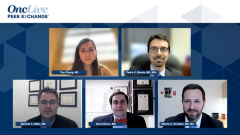
Advanced RCC: Brief Overview
Tian Zhang, MD, provides an overview of renal cell carcinoma (RCC).
Episodes in this series

Tian Zhang, MD: Hello, and welcome to this OncLive® Peer Exchange Evidence-Based Strategies for Selecting and Sequencing Systemic Therapies in Renal Cell Carcinoma: Highlights from ASCO [American Society of Clinical Oncology] GU [Genitourinary Cancers Symposium] 2022 and Beyond. I am Dr Tian Zhang, assistant professor in the Department of Internal Medicine at UT [University of Texas] Southwestern Medical Center, and I’m joined today by a panel of experts in kidney cancer. I would like to welcome my esteemed panel of fellow panelists, and also to have them introduce themselves. Thus, Dr Barata, we’ll go in alphabetical order, Dr Barata first.
Pedro C. Barata, MD, MSc: Hello Tian, how are you? Thanks for having me. I’m Dr Pedro Barata, a GU [genitourinary] medical oncologist and assistant professor of medicine at Tulane University, New Orleans, with Dr Zhang. It’s a pleasure to be here with colleagues and friends.
Tian Zhang, MD: Wonderful. And Dr Bilen.
Mehmet A. Bilen, MD: Hi, everyone. I am Dr Mehmet Asim Bilen, associate professor at Emory University and director of GU Medical Oncology at Winship Cancer Institute. I’m glad to be here today with my dear friends from all around the country and looking forward to the discussion.
Tian Zhang, MD: Wonderful. Dr Braun.
David Braun, MD, PhD: I am Dr David Braun. I’m a physician scientist at the Yale School of Medicine, focus clinically on kidney cancer, and I run a laboratory focus on new immunotherapies for kidney cancer. And I similarly echo, I’m very glad to be here and have this conversation with you all.
Tian Zhang, MD: Congrats on your new role, Dr Braun. And finally, Dr Ornstein.
Moshe C. Ornstein, MD, MA: Hi, I’m Dr Moshe Ornstein. I’m a GU medical oncologist at Cleveland Clinic where I spearhead the kidney cancer efforts. And it’s great to be here tonight with colleagues and friends.
Tian Zhang, MD: Wonderful. Today, we’re going to discuss how recent clinical trials and new FDA [Food and Drug Administration] approvals are shaping the way we treat metastatic kidney cancer. We’ll include key topics discussed at the 2022 ASCO GU meeting, and also the potential impact of new data on all of our clinical practices. Thus, let’s get started on our first topic. And for the first topic, we’re really focused on selecting optimal first-line therapy in advanced clear cell kidney cancer. And to set the stage for this, I just want to remind everyone that we saw the incidences for kidney cancer from the American Cancer Society data that Dr Karen Knudsen, PhD, MBA [American Cancer Society CEO] discussed at GU ASCO this year, with more than 89,000 cases of kidney cancer diagnosed per year. We know that the predominant subtype is clear cell kidney cancer, but there is about 16% papillary, and less than 10% each of chromophobe, collecting duct, translocation type, and medullary renal cell carcinomas. And I think in the era after the CARMENA [Cancer du Rein Metastatique Nephrectomie et Antiangiogéniques] trial, most patients will start a systemic therapy first, if it’s a de novo metastatic disease, and then followed by nephrectomy or consolidative, or sequencing other strategies if they progress after first-line therapies. Hence, in terms of treatment goals for patients with advanced renal cell carcinoma, in my practice, I’m generally trying to get patients to live longer and with ongoing good quality of life. Obviously, shooting also for higher responses, and especially complete responses. And ultimately, I’d love to find patients who will have those deep and durable responses, as I’m sure we’ve all had conversations with each other about shooting for these goals.
This transcript has been edited for clarity.



































